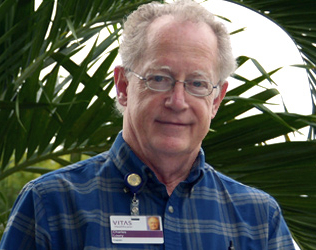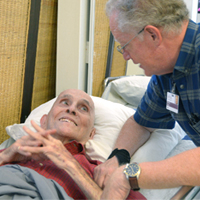Meet Hospice Chaplain Charles Lowry
Hospice Chaplain Profile
“I get the greatest satisfaction in my job as a hospice chaplain by being of service to people who are hurting and by helping them find peace,” says Charles Lowry. As a chaplain with VITAS® Healthcare, Charles provides spiritual support to seriously ill patients and their loved ones, meeting them “where they are” in their spiritual journey.

Charles joined VITAS in 2012. He is a graduate of Louisiana College and earned a master’s degree in religious education from Southwestern Baptist Theological Seminary. After serving as a local church pastor for more than 20 years, he took a break. “After getting out of local church work, I was looking for a new ministry,” explains Charles. “My uncle was a retired Army chaplain and suggested I look into chaplaincy as a new career.”
Charles took his uncle’s advice and enrolled in the clinical pastoral education (CPE) program at Erlanger Medical Center in Chattanooga, Tennessee. During his training he worked in hospitals, nursing homes and hospice. It was then that he decided hospice was the path he was supposed to take.
Honoring Diversity
As a VITAS chaplain, Charles visits four to five patients each day. Although he carries his Bible and has a scripture reading at the ready, he is always aware of his patients’ personal beliefs, culture and traditions. As a hospice chaplain in culturally diverse South Florida, Charles ministers to patients of many beliefs, denominations and religions, from Christian, Jewish, Muslim and Hindu to nonbelievers.
“Some of my patients are very religious and some are not,” explains Charles. “My job is to help those facing their own mortality find out what life is all about. I spend a lot of time doing a life review with them so they can think back and see how blessed they have been. We reminisce so they can feel good about what they’ve done in their life.”
Ministering to Families
Charles’s job is also to minister to his patients’ loved ones. “With families, I try to get them to realize the importance of every minute they have to make lasting memories,” he says. “We’re only given a certain amount of time and we don’t want to let anything go unnoticed.”

Before setting out for his day’s visits, Charles checks to see if any of his patients has died in the night. If so, he immediately goes to see the family. “While the patient is alive, the nurse serves as the case manager. After death, I become the case manager,” he says. “I know the family; we have a relationship and I can decide if they need additional or extended support.” Charles is involved in bereavement support for all his patients, keeping in contact for a year, and sometimes longer, after death.
In some instances, Charles is called upon by the family to officiate at the funeral or to coordinate the services of a rabbi or priest.
“The best part of being a hospice chaplain is that I get more time with my patients than if I worked in a hospital setting,” say Charles. “I see my patients more often and I really get to know the patients and the families.”